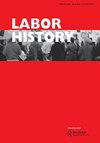《劳务移民的冷战:跨越铁幕的机会、挣扎和适应》
IF 0.7
4区 管理学
Q1 HISTORY
引用次数: 0
摘要
本文是特刊《劳动移民的冷战:跨越铁幕的机会、斗争和适应》的导论,旨在推动冷战历史与移民研究之间的对话。这是欧洲劳工历史网络“劳工迁移史”工作组召开的一次研讨会的成果。它描绘了关于国际劳动力迁移的学术辩论,并批判性地采用了以西方为中心的方法。它介绍了七个贡献,从不同的地理和主题角度,重新评估非西方经验在塑造国际劳动力迁移和冷战之间纠缠的重要性。在本期特刊中,有两条问询线尤为突出。首先是重新评估国际移徙管制作为一个政治领域的相关性,在这个政治领域上,冷战的分裂是由不同的机构行动者建构和解构的,而这些机构行动者在不同的层面上都是由冷战竞争的存在赋予权力的。第二部分是移民的中介,旨在探索移民自身经历国家控制的方式的流动性、机会主义和创造力,这是由于特殊的冷战社会经济和政治背景。本文章由计算机程序翻译,如有差异,请以英文原文为准。
Introduction: the Cold War of labour migrants: opportunities, struggles and adaptations across the Iron Curtain and beyond
ABSTRACT This introduction to the special issue The Cold War of Labor Migrants: Opportunities, struggles and adaptations across the Iron Curtain and beyond seeks to bring forward the conversation between the history of the Cold War and migration studies. It is the result of a workshop convened by the Working Group ‘Labor Migration History’, of the European Labor History Network. It maps out the academic debate on international labor migration and it critically engages with its western-centric approach. It introduces the seven contributions which, from different geographic and thematic perspectives, reassess the importance of non-Western experiences in shaping the entanglement between international labor migration and the Cold War. Two lines of inquiry feature prominently in this special issue. The first is a reassessment of the relevance of the regulation of international migration as a political terrain on which the Cold War divide was both constructed and deconstructed by different institutional actors, which, at various levels, were empowered by the existence of Cold War rivalry. The second, is the agency of migrants and aims to explore the fluidity, opportunism and creativity in the ways that migrants themselves experienced state control because of the particular Cold War socio-economic and political context.
求助全文
通过发布文献求助,成功后即可免费获取论文全文。
去求助
来源期刊

Labor History
Multiple-
CiteScore
1.00
自引率
28.60%
发文量
44
期刊介绍:
Labor History is the pre-eminent journal for historical scholarship on labor. It is thoroughly ecumenical in its approach and showcases the work of labor historians, industrial relations scholars, labor economists, political scientists, sociologists, social movement theorists, business scholars and all others who write about labor issues. Labor History is also committed to geographical and chronological breadth. It publishes work on labor in the US and all other areas of the world. It is concerned with questions of labor in every time period, from the eighteenth century to contemporary events. Labor History provides a forum for all labor scholars, thus helping to bind together a large but fragmented area of study. By embracing all disciplines, time frames and locales, Labor History is the flagship journal of the entire field. All research articles published in the journal have undergone rigorous peer review, based on initial editor screening and refereeing by at least two anonymous referees.
 求助内容:
求助内容: 应助结果提醒方式:
应助结果提醒方式:


